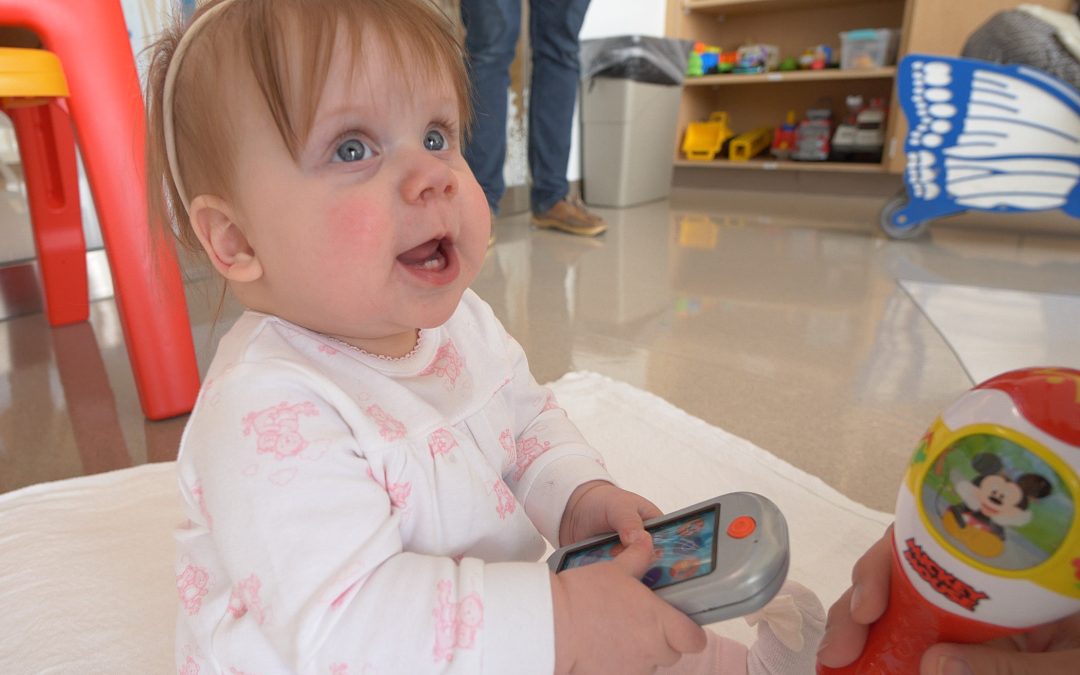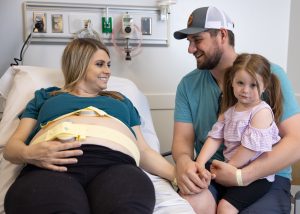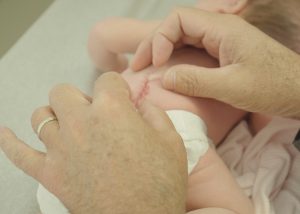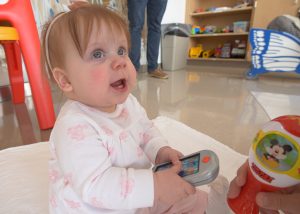This story is reprinted with permission from Stewardship Partner Nationwide Children’s Hospital. October is Spina Bifida Awareness Month, so we’re celebrating success and a new path of treatment for babies affected by spina bifida.
During her 20-week ultrasound appointment, Brittany Badenhop learned her baby had spina bifida, a birth defect that occurs during the development of the central nervous system very early on in pregnancy. Spina bifida affects one out of every 2,000 births in the United States each year, and some children diagnosed will need to use a walker or a wheelchair their entire life. However, more than a year after surgery at the Fetal Center at Nationwide Children’s Hospital to repair their baby’s spina bifida in the womb, the Badenhop family is celebrating Lexi’s progress as she turns one.
“To look at Lexi, you would never suspect that there’s something different about her,” said Brittany Badenhop. “You would never suspect that she is a child with spina bifida unless you saw the little scar on her back. She looks like a typical child who is the happiest baby you’ve ever seen, smiling, laughing, having fun with her sister.”
Brittany’s clinical team of experts at Nationwide Children’s Fetal Center said initial tests showed that she was a perfect candidate to undergo fetal surgery. Early intervention is changing the trajectory for children with spina bifida by reducing the severity of symptoms and improving long-term outcomes.
Changing the course of spina bifida treatment
“In the past, women who needed fetal surgery had to go out of the area to get care,” says Oluyinka Olutoye, MD, PhD, fetal surgeon and surgeon-in-chief at Nationwide Children’s Hospital. “Now, we can provide that service and care for them right here at Nationwide Children’s.”
More than a year ago, the fetal experts at Nationwide Children’s Hospital made a small opening in Brittany’s uterus, accessing baby Lexi and successfully closing her spina bifida defect. This procedure was the first fetal surgery through the hospital’s Fetal Center, led by a team of experts with decades of experience in fetal medicine and fetal surgery.
“Our team performed surgery at 25 weeks to mitigate the potential complications of spina bifida and improve the long-term outcome,” said Adolfo Etchegaray, MD, chief of fetal medicine at Nationwide Children’s Hospital. “Brittany was able to carry the baby to term. She had a scheduled C-section at 37 weeks with no complications.”
Lexi’s future
Recently, Lexi returned to Nationwide Children’s for her first MRI post-fetal surgery, marking a critical milestone in her development. The fetal team was extremely happy to see no fluid build-up on Lexi’s brain while reviewing her MRI, indicating the surgery continues to be a success.
“She’s doing great,” said Jeffrey Leonard, MD, chief of neurosurgery at Nationwide Children’s Hospital. “She’s functionally standing and she’s wearing braces, has not had a shunt, which is critical to this. We’re watching bigger ventricles than usual, but there’s been no signs of elevated pressure and she’s continuing to develop well, so I’m very pleased with where she is at this point.”
Dr. Leonard said Lexi is not quite walking on her own yet, but he expects her to hit that milestone within the next few months. The fetal team also said Brittany and her husband, Jared, are doing a tremendous job ensuring Lexi is meeting her developmental milestones. Brittany said she cannot imagine where Lexi would be today if she hadn’t undergone fetal surgery.
“Everything she does every day is a step in the right direction,” said Brittany. “Her fine motor skills are wonderful and she’s kind of learning how to use those. And she works hard at it. She works hard at physical therapy. It’s been a great experience for our family, and we’re so hopeful for what she’s going to do in the future.”
About Nationwide Children’s
Nationwide Children’s is one of only a few fetal centers in the Midwest, and across the United States, to offer a full range of fetal therapies including fetal intervention and fetal surgery, to treat conditions such as: cervical teratoma (giant neck mass), congenital diaphragmatic hernia (CDH), congenital lung lesions, fetal heart defect, sacrococcygeal teratoma (SCT), spina bifida and its most severe form, myelomeningocele, and twin-to-twin transfusion syndrome (TTTS).
“We’re able to provide the full range of fetal care,” said Dr. Olutoye. “Be it imaging, diagnostics, genetic testing, the counseling, being able to provide the medical therapies that are needed, and also the surgical therapies needed, be it minimal access surgery or open fetal surgery. The entire spectrum of care is what we are prepared to provide here at Nationwide Children’s Fetal Center.”




